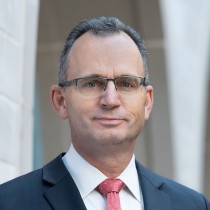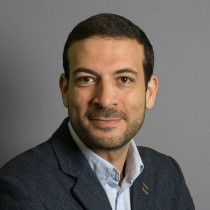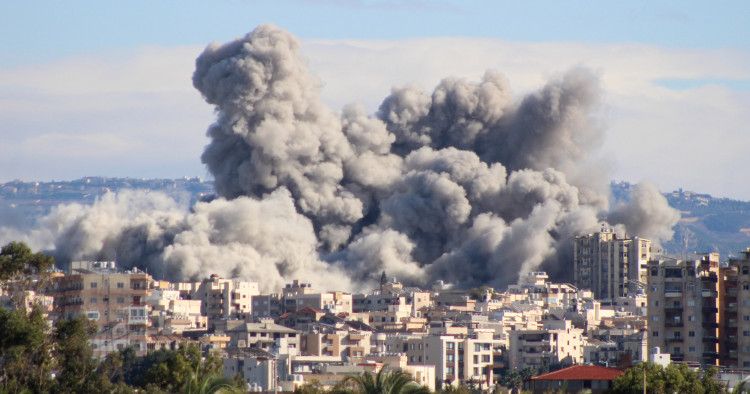Contents:
- A cease-fire for Thanksgiving? Israel-Lebanon deal reported to be imminent
- ICC arrest warrants broadly condemned in Israel, but some reflect on how their country got here
- Mixed signals on the Middle East from Trump in the early stages of the transition
- COP29 climate conference concludes amid disappointment from developing countries and uncertainty about future diplomatic progress
- Mounting terrorism in Pakistan acquires a cross-regional dimension
A cease-fire for Thanksgiving? Israel-Lebanon deal reported to be imminent
Paul Salem
Vice President for International Engagement
Note: A cease-fire agreement was announced after publication of this article. The deal, which received approval by the Israeli war cabinet but had not yet been approved by the full cabinet as of late Nov. 26, was scheduled to take effect at 04:00 on Nov. 27.

-
A cease-fire agreement between Israel and Lebanon is said to be close, bringing hopes of relief for the displaced and traumatized people along both sides the Lebanon-Israel border
-
A deal would be a rare and welcome win for the outgoing Biden administration and might empower efforts to reach an end to hostilities in Gaza as well.
Officials in Israel, Lebanon, Washington, and Paris indicate that a cease-fire agreement between Israel and Lebanon might be imminent. The deal would be the first potentially lasting cease-fire after 13 months of war following the Hamas attack on Oct. 7, 2023, and a rare diplomatic win for the outgoing team of President Joe Biden. It would enable tens of thousands of displaced people in Lebanon and Israel to return to their towns and villages, would give Lebanon a chance to move on from five years of profound crisis, and just might indicate better chances for a potential Israel-Hamas deal in Gaza.
The deal calls for a 60-day halt to fighting during which Hezbollah and Israel will both withdraw from the border area of south Lebanon. The Lebanese Army and the multinational United Nations Interim Force in Lebanon (UNIFIL) would fill the security vacuum, and the United States would head an international committee to supervise the implementation of the agreement. If the initial terms are successfully executed, then the cease-fire would be indefinitely extended and the US would broker Israeli-Lebanese talks on finally demarcating their disputed border. Israel is asking for an Israeli-American side arrangement in which Israel reserves the right to resume military action if Hezbollah violates the agreement, or if the Lebanese Army and UNIFIL fail to thwart Hezbollah violations.
A cease-fire is desperately needed in Lebanon, first to enable 1.2 million displaced people to return to their homes, but also to organize the large-scale humanitarian and reconstruction aid that will be necessary to render their towns and villages habitable again. Lebanon has been without a president and functioning government for two years; the cease-fire could create the conditions for moving ahead with holding presidential elections, forming a government, and beginning to address Lebanon’s vast and urgent domestic needs.
Agreeing to a cease-fire deal with Hezbollah has been easier for Israeli Prime Minister Benjamin Netanyahu than agreeing to a deal with Hamas. But if his political career survives negotiations with Hezbollah, might he feel more encouraged to risk a similar deal with Hamas? In both cases, he can claim to have decapitated and largely degraded Israel’s opponents, and in both cases complete elimination of either foe has remained out of reach.
The outgoing Biden administration has scored a valuable diplomatic win on its way out the door; can the incoming administration of Donald Trump build on it?
Follow: @paul_salem
ICC arrest warrants broadly condemned in Israel, but some reflect on how their country got here
Nimrod Goren
Senior Fellow for Israeli Affairs

-
Israeli leaders, from the ruling coalition and opposition alike, flatly reject the International Criminal Court’s arrest warrants against Prime Minister Benjamin Netanyahu and former Minister of Defense Yoav Gallant.
-
As Israelis debate possible practical implications of this development, and assess how various countries react, some are reflecting on the wrongdoings by Netanyahu that led the country to such a shameful situation.
The International Criminal Court’s (ICC) decision to issue arrest warrants against Israeli Prime Minister Benjamin Netanyahu and former Minister of Defense Yoav Gallant did not catch Israel by total surprise. The judgment was in the making for months, and the direction was clear, even if the exact timing was unknown.
For most Israelis, the court’s decree seems baffling, and they outright reject it. The war in Gaza is viewed in Israel as maximally justified and as an act of self-defense following the Hamas atrocities of Oct. 7, 2023. But instead of understanding, empathy, and support from the international community, many Israelis feel they have received unjust criticism and hostility. This sentiment is partly encouraged by the fact that images of Palestinian civilian suffering are generally absent from Israeli media coverage, creating a gap between how the war is perceived by Israelis and people abroad.
Israeli politicians of different stripes — ruling coalition members and opposition leaders alike — reacted harshly to the ICC news, attacking both the decision itself and the international judicial body more generally.
President Isaac Herzog called it a “dark day” for humanity and justice; Attorney General Gali Baharav-Miara said the court has “failed in its historic role”; Prime Minister Benjamin Netanyahu expressed “disgust” toward the decision, labeling it as antisemitic and a “modern Dreyfus trial”; and far-right Minister Itamar Ben-Gvir stated that, in response, Israel should annex the entire West Bank and dramatically expand settlements.
Opposition leader Yair Lapid, from the centrist Yesh Atid party, called the arrest warrants a “reward for terrorism”; former Israel Defense Forces Chief of Staff Benny Gantz, who served as the defense minister in the previous Israeli cabinet, said the ICC decision is a “moral blindness and shameful stain”; right-wing party Yisrael Beiteinu leader Avigdor Lieberman claimed it is proof of international double standards and hypocrisy toward Israel; and chair of the left-wing The Democrats party, Yair Golan, said it was “shameful.” Only among the Arab parties was the decision seen as legitimate and worthy of support.
Netanyahu tried to quickly leverage this development to further cement his political power. He framed the ICC decision as against all Israelis, not only him and Gallant. The prime minister seems to view it as an opportunity to delegitimize international legal institutions, and he quickly labeled the decision as justifying the postponement of his upcoming testimony in his domestic corruption trial.
For most Israelis, however, the consequences of the decision are still not clear. Is it a dramatic game-changer, indicating that Israel is on the path of becoming a “pariah state?” Or is it just another bump in the road, which Israel will overcome with the support of the incoming Donald Trump administration in the United States?
In any case, there are multiple concerns in Israel about what might happen next. Will additional warrants be issued against soldiers and reservists who fought in Gaza and might now be arrested when going abroad? Will the decision negatively impact Israel’s economy, security, and global standing, and to what extent? Will it encourage anti-Israel boycotts in fields such as academia, culture and sports?
For now, most Israelis are taking stock of how different countries reacted to the ICC decision, assessing who is a friend and who is a foe. Some, however, also see it as a time for reflection. The latter have criticized Netanyahu for enabling the country to reach such a shameful situation, and they have spelled out steps that could have prevented this outcome — including, at a minimum, enabling more humanitarian aid to enter Gaza and appointing a state committee of inquiry, as advised by Israel’s own attorney general some months ago.
Follow: @GorenNimrod
Mixed signals on the Middle East from Trump in the early stages of the transition
Brian Katulis
Senior Fellow for US Foreign Policy

-
Donald Trump has started to assemble his national security team for a second term, and the early indications, which include a number of hardliners on Iran and individuals with close ties to Israel, offer a mixed bag of signals about what to expect in the Middle East.
-
Yet recent comments from Michael Waltz, the incoming national security advisor — referencing the previous Trump administration’s successes regarding the Abraham Accords as a sign of what is to come — indicate a possible willingness to invest time and effort on the region.
With less than two months to go until Donald Trump returns to the presidency, the transition is moving forward with a rapid series of announcements about cabinet nominees and other key figures. It is premature to draw major conclusions about what these initial appointments might mean for the incoming administration’s likely approach to the Middle East, but the initial signs are that Trump is putting together a team that has hawkish views on Iran and close ties to the current Israeli government.
The primary focus right now is on practical issues — filling key positions and remaining alert to crises that might emerge in this transition period. Michael Waltz, the incoming national security advisor for President-elect Trump, speaking on Fox News Sunday this past weekend, indicated that he has met with President Joe Biden’s National Security Advisor Jake Sullivan to coordinate on the handover of power.
Waltz had a clear message about the need to make the transition smooth, noting, “For our adversaries out there that think this is a time of opportunity, that they can play one administration off the other, they’re wrong. We are hand in glove, and one team with the United States in this transition.”
Trump’s picks for senior positions on national security indicate that he is looking to assemble a team of loyalists who won’t outshine him or have different agendas from his, a contrast to his first term, when he had prominent figures in Gen. Jim Mattis and former Exxon executive Rex Tillerson heading the Departments of Defense and State, respectively. Some of the early picks this time around, including the nominees for secretaries of state and treasury, indicate a more aggressive approach to China, particularly on economic issues. The United States and China’s economic competition will likely have implications for US relationships across the Middle East.
In his aforementioned Fox News appearance, Waltz spoke briefly on the Middle East, praising Israel’s strength and “grit,” and highlighted how Hezbollah and Hamas have been devastated by Israel’s recent military operations. He also noted that Iran is “incredibly exposed.” When asked about the next steps, the incoming national security advisor indicated that “now is a moment to craft some type of arrangement that doesn’t just put a pause for future October 7ths, [but] truly brings stability to the Middle East, sets the stage for what we saw just a few years ago with the Abraham Accords … we had peace deals being signed on the White House lawn just four years ago. Look at where we are today. I am confident President Trump and his leadership and the team he is putting around him will get us back to that point in pretty short order.” These comments indicate a possible willingness by the incoming Trump team to invest time and effort on the Middle East.
Initial early appointments include Trump’s nominee for ambassador to Israel, Mike Huckabee, a former governor and evangelical Christian who has made controversial comments denying that Palestinians exist. Steven Witkoff, the billionaire real estate investor Trump named as his Middle East special envoy, has experience in the region and close business ties with some Gulf states as well as Israel. Also in the mix is Sebastian Gorka, a contentious figure who has made statements about Islam as a threat to Western civilization, served during part of Trump’s first term in office, and is reportedly returning to work on counterterrorism at the White House. Some of Gorka’s former colleagues in the Trump administration, including former National Security Advisor H. R. McMaster, criticized Gorka’s return to the National Security Council.
These early statements and initial appointments point to a more hawkish, conservative approach to Israel and the broader Middle East, with the aspirations of ending wars and striking bigger deals than the 2020 Abraham Accords. The challenge Trump’s incoming team will face will come from the region itself, which bears very little resemblance to what the Middle East looked like when he first entered office in 2017.
Follow: @Katulis
COP29 climate conference concludes amid disappointment from developing countries and uncertainty about future diplomatic progress
Karim Elgendy
Non-Resident Senior Fellow

-
The just-concluded United Nations Climate Change Conference (COP29), in Baku, made some progress on climate financing, but the participating governments deferred the discussion on implementation to next year’s COP30, in Brazil.
-
The extent of the need — $1.3 trillion per year for the next decade — and an uncertain role for the United States following the November elections throws a shadow on the proceedings.
The just-concluded 29th United Nations Climate Change Conference (Conference of the Parties, COP29), in Baku, marked a crucial milestone in the post-Paris Agreement era, positioning itself as the second component of a critical three-COP sequence focused on implementing the Global Stocktake (GST). While COP28 started the groundwork for transitioning away from fossil fuels and expanding renewable energy capacity, COP29’s agenda focused on implementing these ideas and, more critically, on addressing the complex challenge of climate finance.
The conference achieved some successes in climate finance architecture, establishing some consensus on the quantum, sources, and types of financing. The new finance agreement includes direct country grants, private-sector investments, and multilateral development bank loans. A notable diplomatic achievement was accounting for China’s voluntary financial contributions to climate vulnerable nations within the global funding structure, partially addressing a long-standing point of contention in international climate negotiations.
These developments aligned with the UN secretary-general's Independent High-Level Expert Group (IHLEG) recommendations, which identified a need for $1.3 trillion annually in climate finance for emerging markets and developing countries (excluding China) by 2035, targeting an equal split between public and private funding sources.
However, the conference faced challenges in advancing implementation discussions regarding clean energy commitments made during COP28, including the transition away from fossil fuels and the expansion of renewable energy. These crucial operational details were deferred to intersessional meetings in Bonn, highlighting the ongoing complexity of translating high-level agreements into actionable plans.
The international relations landscape significantly influenced the proceedings, marked by shifting power dynamics. China’s rising influence in climate diplomacy contrasted sharply with the anticipated diminished role of the United States following the re-election of President Donald Trump. These evolving dynamics may reshape future climate negotiations and implementation strategies.
At the regional level, the conference saw the launch of the ambitious TeraMed campaign, a civil society initiative targeting the installation of 1 terawatt (TW) of renewable energy capacity in the Mediterranean region by 2030. This effort, representing approximately 10% of the global 11 TW target, demonstrates the growing importance of regional cooperation and non-state actors in advancing climate action.
COP29’s outcomes reflected both limited progress and persistent challenges in global climate action. In doing so it set the stage for the crucial COP30, to be held in November 2025, in Belem, Brazil, where countries will focus on updating their nationally determined contributions (NDCs).
Follow: @nomadandsettler
Mounting terrorism in Pakistan acquires a cross-regional dimension
Marvin G. Weinbaum
Director, Afghanistan and Pakistan Studies

-
Pakistan’s Balochistan and Khyber Pakhtunkwha provinces are seeing a surge in terrorist activity by religious extremists and ethnonationalist separatists, such as Tehrik-e-Taliban and the Baloch Liberation Army.
-
Growing insecurity and attacks on Chinese infrastructure projects in the region are leading to closer security cooperation between Iran and Pakistan, with the potential for China to join in a future trilateral partnership.
Pakistan’s terrorism landscape has undergone substantial transformation, with 2024 emerging as the deadliest year for the country. Alarmingly, 97% of terror-related fatalities have been concentrated in Balochistan and Khyber Pakhtunkhwa, regions that continue to serve as strongholds for religious extremist and ethno-nationalist separatist militant groups such as Tehrik-e-Taliban (TTP), which pose a grave threat to Pakistan. According to the latest available data, militant insurgency in the two provinces resulted in 55 deaths among security forces in the first three weeks of November alone. In October, security forces lost 62 personnel, marking the highest number of such casualties in any month this year. Balochistan, a province of 15 million people, with 65% of its population under 30, is also the base of the Baloch Liberation Army (BLA), which seeks full independence from the country.
Once politically and ideologically distinct from each other, there appears to be a narrowing divide between the BLA’s traditional secular nationalism and the TTP’s religious extremism. Reports indicate substantial high-level collaboration between the two groups, including operational support, weapons trading, logistical aid, intelligence sharing, and even coordinated attacks against Pakistani security forces and law enforcement agencies. The BLA, once a low-intensity separatist insurgent group, has escalated its activities in the province by launching large-scale, coordinated attacks on high-value targets. Over time, the BLA has also adopted the more lethal tactics normally associated with Islamist militant groups, such as suicide bombings.
A key component of the BLA, the Majeed Brigade, a suicide squad with a number of women in it ranks, is believed to have carried out most of the group’s sophisticated attacks. While the exact size of the full BLA remains unknown, it is estimated to include more than 6,000 highly trained guerrilla fighters. Owing to its ability to recruit educated Baloch youth, the BLA’s resurgence has outpaced the TTP. Longstanding grievances among the Baloch, including poverty, deprivation, alleged extrajudicial abuses, and political suppression, have created fertile ground for recruitment. Many BLA leaders and fighters are former professionals and university students who perceive their armed struggle as a Baloch nationalist liberation movement.
The leading BLA terrorist targets are the billion-dollar projects associated with the China-Pakistan Economic Corridor (CPEC). Portraying its fight as self-sacrifice for the broader political cause of resistance to exploitation, the BLA has claimed violent, high-profile attacks on Chinese workers and infrastructure projects. In response, Pakistan’s government recently recognized the need to energize its counterterrorism campaign in Balochistan, announcing the launch of a comprehensive military operation against the group. This shift in counterterrorism strategy, from small-scale, intelligence-based operations to a full-scale military campaign, comes as a response to the shortcomings of earlier efforts to deal with the surge in BLA terrorism.
The escalation is widely viewed as Pakistan’s attempt to satisfy Chinese security concerns. Repeated terrorist attacks have led Beijing to demand cooperation in stronger counterterrorism measures. Last week, China unveiled a plan for Pakistan-hosted joint counterterrorism exercises labeled “Warrior-VIII.” Over 300 Chinese troops have already arrived in Pakistan and are scheduled to remain until mid-December. Although it is unlikely that Chinese troops will participate in anti-BLA military operations while in Balochistan, their presence is further evidence of China’s growing role as a security stakeholder as well as a development-focused investor in Pakistan.
Pakistan’s decision to launch a full military operation in Balochistan is also of wider regional significance. Islamabad is actively seeking Beijing’s backing for a unified stance against the TTP, which is operating mainly from Afghanistan. Pakistan’s relations with Iran have also come into play. In neighboring Iran’s Sistan-Baluchistan province, the Islamic Revolutionary Guard Corps (IRGC), Basij volunteer forces, local law enforcement, and intelligence agencies are already conducting a military operation called “Martyrs of Security” against the Iran-based Sunni Baluch separatist group Jaish al-Adl, which reportedly has ties with the Pakistan-based BLA.
Earlier this month, Iranian Foreign Minister Seyed Abbas Araghchi visited Pakistan, hinting at Tehran’s interest in joint military cooperation to combat cross-border terrorism. Given the shared threat posed by Baloch/Baluch separatists, it seems likely that Pakistan and Iran will collaborate and possibly look to enlisting China. This potential trilateral counterterrorism partnership could not only strengthen their strategic relations but also improve cross-border security and further regional stability.
Research assistant Naade Ali contributed to this piece.
Follow: @mgweinbaum
The Middle East Institute (MEI) is an independent, non-partisan, non-for-profit, educational organization. It does not engage in advocacy and its scholars’ opinions are their own. MEI welcomes financial donations, but retains sole editorial control over its work and its publications reflect only the authors’ views. For a listing of MEI donors, please click here.













